 Many of my readers will be familiar with this – but I wanted to mention it for those to whom it’s new. McLeod Ganj (in upper Dharamsala) is an area where the old and the new meet. Tibetan refugees make up the bulk of the population in this small section of the larger city, and it’s way up on the hillside just below 6,000 feet elevation. Above it rise the foothills of the western Himalayas (more precisely the Dhaula Dahr – a spur of the Himalayan range) and those we can see, which still have significant snow on them, peak at maybe 12,000 feet, and are quite steep.
Many of my readers will be familiar with this – but I wanted to mention it for those to whom it’s new. McLeod Ganj (in upper Dharamsala) is an area where the old and the new meet. Tibetan refugees make up the bulk of the population in this small section of the larger city, and it’s way up on the hillside just below 6,000 feet elevation. Above it rise the foothills of the western Himalayas (more precisely the Dhaula Dahr – a spur of the Himalayan range) and those we can see, which still have significant snow on them, peak at maybe 12,000 feet, and are quite steep.
As is the case for most of India, electricity and communications are relatively modern. The electricity fails frequently, and on the day I arrived, the power had been out since morning and only returned at 5pm. It was a bit unusual, but very few people were bothered by it, and most of life continued without interruption. (One exception being the phones in the hotels, which depend on a PBX to power and connect their extensions.) Most people and businesses with electronic equipment have uninterruptable power supplies (UPSs) and these will at least power their computers for a few minutes during short interruptions. many have put together large banks of automobile batteries and inverters (that change DC from the batteries to the required AC to power electrical devices) in order to power their computers far longer. The UPSs also filter the incoming power to reduce voltage fluctuations, and anyone considering an expensive computer automatically figures they’ll need a UPS.
Telephones work pretty well, but certain things are unheard of – for instance, the concept of having a single “main phone number” for a business, with additional lines to automatically handle overflow calls, seems completely foreign. Instead, every business or office has to advertise two, three, or more individual and unrelated phone numbers, and if you call and the first number is busy, then you have to hang up and call the second number. In other words, there is no “roll over” if a number is busy. And (I am told that) once in a while the phone company runs out of numbers for an area, so they’ll just add a digit to the numbers for a town, and they don’t announce this – it just happens one day and everyone has to figure out what happened.
 Broadband Internet access, however, has finally penetrated this area of India and it is being welcomed. There are probably 30 Internet cafes in this small town and they’re frequently jammed with customers. They are the tourist’s primary means of picking up email, since other forms of access are unavailable.
Broadband Internet access, however, has finally penetrated this area of India and it is being welcomed. There are probably 30 Internet cafes in this small town and they’re frequently jammed with customers. They are the tourist’s primary means of picking up email, since other forms of access are unavailable.
The Tibetan Buddhist culture, which represents over 2,500 years of Buddhist thought, and over 1,100 years of Tibetan Buddhist tradition, lives and breathes alongside the developing technologies. In fact, if you look at some of the practices, you might get the impression the Buddhist monks were secretly engineers, creating “religious technologies” – for example, the prayer wheel (see photo) is a cylinder that spins on its axis – a Buddhist prayer is inscribed around the outside of the wheel, and passers-by will spin each wheel, which causes the words of the prayer to ascend to the heavens. A marvelous “technological” way to multiply the number of prayers that can be said!
 The area where the AirJaldi summit is being held is high on a hillside, as is all of McLeod Ganj. Houses that appear to be one story high at street level continue down the hill on their backsides for many stories. Enter the “ground floor” from street level and you may find yourself 50 feet above the lowest level of the building. (San Francisco, my home, has lots of neighborhoods like this, but it’s not common many other places.) Taxis navigate narrow roads, which in many places are not wide enough for cars to pass. In spite of this, tour buses and trucks come up here and traverse these extremely narrow roads.
The area where the AirJaldi summit is being held is high on a hillside, as is all of McLeod Ganj. Houses that appear to be one story high at street level continue down the hill on their backsides for many stories. Enter the “ground floor” from street level and you may find yourself 50 feet above the lowest level of the building. (San Francisco, my home, has lots of neighborhoods like this, but it’s not common many other places.) Taxis navigate narrow roads, which in many places are not wide enough for cars to pass. In spite of this, tour buses and trucks come up here and traverse these extremely narrow roads.
One of the major problems faced by these remote areas is that young people are leaving them to go to the cities where there are more jobs. Until recently, technology didn’t provide stable ways that the information technology revolution could be used to bring more service jobs to places like McLeod Ganj (because of unreliable electricity, unsophisticated phones, and lack of broadband). The situation has been improving greatly, just during the two years I’ve been coming here, and I hope to see it continue. This might give this population a much better chance of improving their economic conditions as they become more and more connected to the rest of the world. There is some significant movement in this direction, and I’ll try to report on some projects as they mature and begin to publicise their activities.
Leave a Reply